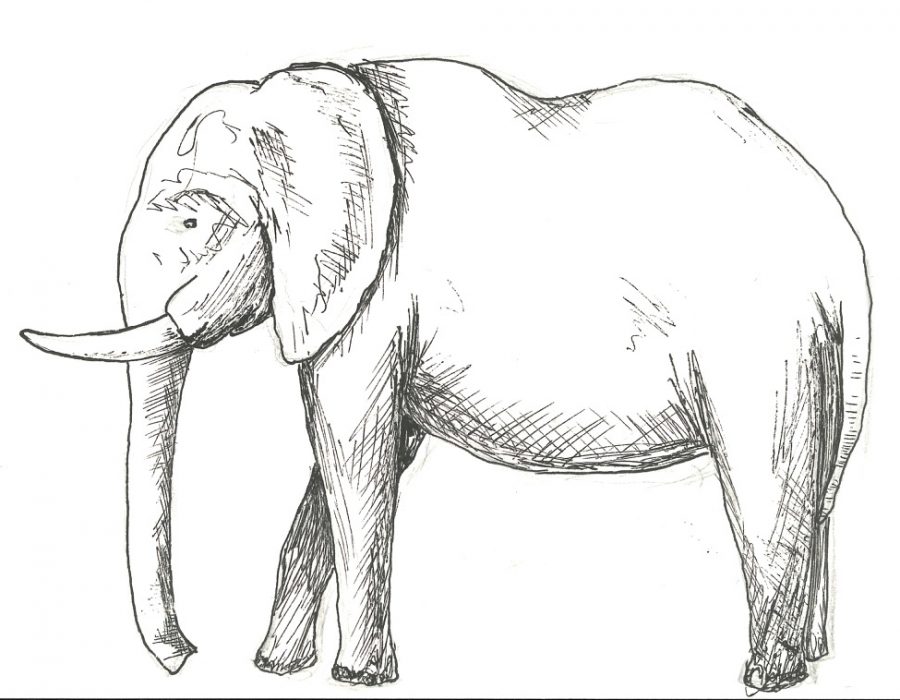The Selfishness of Trophy Hunting
Current Policies Will Not Satisfy Needed Hunting Reform
December 19, 2017
Graceful elephants may be among the first images that come to mind when one considers the wilds of Africa, but this image may only be bound to the history books as trophy hunting protections come under fire. Hunting has always existed in many forms, but a recent poaching increase and normalization of trophy hunting has caused a dramatic decrease in populations of big game, particularly among elephants.
Under a slew of environmental protections by President Obama in 2014, the import of elephant trophies such as tusks and heads was banned from many countries where hunters go on safari. While poaching and the illegal ivory trade remained a serious problem, these regulations led to the the close of a legal route of hunting through which many had hunted elephants for no purpose other than to impress and entertain.
To kill any animal for entertainment in the 21st century is inappropriate, let alone an endangered one. Images of elephants and giraffes gunned down by grinning children, adults, or Donald Trump’s own sons should conjure not only feelings of disgust, but of shame that our species (for we are a collection of intelligent animals ourselves) has reached a point where we can no longer recognize our own place in nature.
In the early 20th century, elephant populations were in the millions, but saw a dramatic decline to around 400,000 today due to habitat loss and poaching. Trophy hunting is by no means the leading cause of elephant population decline, nor was it in the era of European imperialism. But trophy hunting is the symptom of a wider problem—a lack of recognition of the true risk humans pose to the environment. Trophy hunters are indirectly claiming that the power they hold over the environment and elephant populations is nonexistent; to not hunt is to acknowledge the views of conservationists, and, by extension, that their own actions are wrong.
On November 16th however, the US Fish and Wildlife Service made a puzzling decision: To support “well-managed hunting programs” backed up by economic conjecture. The Service claimed that by permitting the import of elephant trophies, this would encourage the purchase of new hunting licenses and provide money that could go directly back to the conservation effort. And though removed restrictions will encourage hunting, there is little evidence to show that any money spent by hunters will return to locals, rangers, or conservation groups.
Though trophy hunting remains a small industry in the parts of Africa where it remains legalized, the ecological impact on elephant populations far outweighs any fees paid by hunters. Male elephants are prized among hunters for their large stature and tusks, and these have seen the sharpest declines because of “desirable” characteristics.
With the deaths of the strongest males comes the decline in a population’s gene pool, and the spread of genes for, say, smaller tusks, less prominent manes, and diseases that would otherwise discourage mating. Contrasting with natural predation, where individuals with undesirable or harmful traits are picked off as the stronger ones survive, trophy hunters go for the largest and strongest targets, whose tusks or teeth cannot save them from bullets.
A change of tone came recently from President Donald Trump, who tweeted that he would “review all conservation facts” pending further research into the adjusted policy. But while this policy reversal brought with it some hope from an unlikely source, this should hardly be taken as a return to Obama-era policies, and certainly not a reform of much-needed conservation efforts. Trump’s own sons have proudly posted images of their kills online, and while their father does not participate in the killings, an extensive history of policy flip-flopping should be more than enough to prove that Trump’s efforts are in response to what he desires most: public attention, supporter loyalty, and media coverage.
Elephants and big game animals are among the most graceful and exotic on the planet, and while they may have once appeared worthy opponents to the first hunters, any hope of a fair fight between humans and elephants quickly faded.
Trophy hunting is no longer the entertaining, heart-racing undertaking that it once was; it is the slaughter of already endangered species for minimal gains of those rich enough to afford the price of extinction. And as the fate of elephant populations across the globe hangs in the balance, it is now that we must ask ourselves which is more important: the well-being of life on our planet, or a taxidermied head to adorn our living room walls?
This piece also appears in our December print edition.











